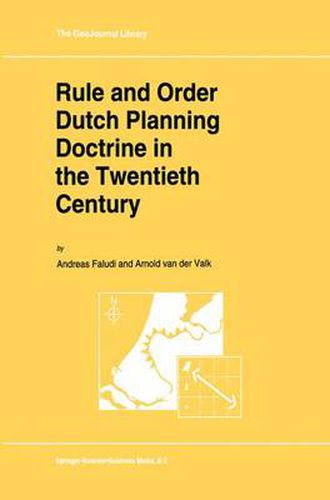Readings Newsletter
Become a Readings Member to make your shopping experience even easier.
Sign in or sign up for free!
You’re not far away from qualifying for FREE standard shipping within Australia
You’ve qualified for FREE standard shipping within Australia
The cart is loading…






This title is printed to order. This book may have been self-published. If so, we cannot guarantee the quality of the content. In the main most books will have gone through the editing process however some may not. We therefore suggest that you be aware of this before ordering this book. If in doubt check either the author or publisher’s details as we are unable to accept any returns unless they are faulty. Please contact us if you have any questions.
This book is about an art in which the Netherlands excels: strategic planning. Foreign observers will need little convincing of the merits of Dutch planning. They will want to know whether routine explanations (small country, industrious, disciplined people hardened by the perennial fight against the sea) hold any water, and they will want to know where to look for the bag of tricks of Dutch planners. Dutch readers need to be convinced first that planning in the Netherlands is indeed effective before contemplating how this has come about. Our message for both is that, to the extent that Dutch planners do live in what others are inclined to see as a planners’ paradise, it is a paradise carefully constructed and maintained by the planners themselves. This smacks of Bernard Shaw describing a profession as a conspiracy against laity. However, all knowledge and all technologies are ‘socially constructed’, meaning that they are the products of people or groups pursuing often conflicting aims and coming to arrangements about what is to pass as ‘true’ and ‘good’. So this takes away the odium of Dutch planners having their own agenda. Positioning ourselves We are in the business of interpreting Dutch planning, and at the same time committed to improving it. This makes us part of the situation which we describe. This situation is characterized by the existence of two divergent traditions, urban design and the social-science discipline called ‘planologie’.
$9.00 standard shipping within Australia
FREE standard shipping within Australia for orders over $100.00
Express & International shipping calculated at checkout
This title is printed to order. This book may have been self-published. If so, we cannot guarantee the quality of the content. In the main most books will have gone through the editing process however some may not. We therefore suggest that you be aware of this before ordering this book. If in doubt check either the author or publisher’s details as we are unable to accept any returns unless they are faulty. Please contact us if you have any questions.
This book is about an art in which the Netherlands excels: strategic planning. Foreign observers will need little convincing of the merits of Dutch planning. They will want to know whether routine explanations (small country, industrious, disciplined people hardened by the perennial fight against the sea) hold any water, and they will want to know where to look for the bag of tricks of Dutch planners. Dutch readers need to be convinced first that planning in the Netherlands is indeed effective before contemplating how this has come about. Our message for both is that, to the extent that Dutch planners do live in what others are inclined to see as a planners’ paradise, it is a paradise carefully constructed and maintained by the planners themselves. This smacks of Bernard Shaw describing a profession as a conspiracy against laity. However, all knowledge and all technologies are ‘socially constructed’, meaning that they are the products of people or groups pursuing often conflicting aims and coming to arrangements about what is to pass as ‘true’ and ‘good’. So this takes away the odium of Dutch planners having their own agenda. Positioning ourselves We are in the business of interpreting Dutch planning, and at the same time committed to improving it. This makes us part of the situation which we describe. This situation is characterized by the existence of two divergent traditions, urban design and the social-science discipline called ‘planologie’.